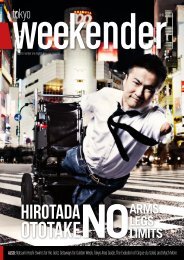Tokyo Weekender - October 2017
A day in the life of a geisha. Find your perfect Kyushu. Plus Q&A with anime director Keiichi Hara, are robots taking our jobs?, Explore Japanese cuisine at GINZA SIX, and Tsukuda guide
A day in the life of a geisha. Find your perfect Kyushu. Plus Q&A with anime director Keiichi Hara, are robots taking our jobs?, Explore Japanese cuisine at GINZA SIX, and Tsukuda guide
You also want an ePaper? Increase the reach of your titles
YUMPU automatically turns print PDFs into web optimized ePapers that Google loves.
Not quite yet, but they are filling<br />
in a few gaps, from hotel staff to<br />
Buddhist monks. We take a look<br />
at some of the positions currently<br />
held by humanoids in Japan<br />
Words by Matthew Hernon<br />
In 1970 Japanese robotics professor Masahiro Mori identified<br />
the concept of “Bukimi no Tani Gensho,” which became<br />
known in English as "The Uncanny Valley." His hypothesis<br />
stated that the anthropomorphism of robots was appealing<br />
up to the point where they become too human-like, at<br />
which stage our feelings change to those of revulsion.<br />
Osaka University professor and roboticist Hiroshi<br />
Ishiguro's 2015 creation Erica could be cited as an example.<br />
The incredibly realistic-looking humanoid – which has sat<br />
through numerous press conferences answering journalists’<br />
questions, and can simulate human expressions – has been<br />
described as the "most beautiful," and "the creepiest," robot<br />
ever made.<br />
Whichever side of the fence you sit on, there is no doubt<br />
that for some people Mori's theory rings true. Another issue<br />
is the fear that robots could make people redundant in the<br />
future. According to studies by data analysis firm Nomura<br />
Research Institute (NRI), around half of the jobs in Japan<br />
could be done by artificial intelligence within 20 years.<br />
While that may sound unnerving, in a country with an aging<br />
population and a shrinking workforce would it really be<br />
such a terrible thing?<br />
The government here certainly doesn't think so. In<br />
2015 the Robot Revolution Initiative Council was set up in<br />
an effort to take robotics to another level. Since then we've<br />
seen a growing number of Japanese robots making headlines<br />
for their contributions to the service industry. In many<br />
cases companies are using them more as public relations<br />
tools than anything else, but it's still interesting to see the<br />
progress that's being made. So what kind of jobs are they<br />
currently doing? Here's a look at a few of the more intriguing<br />
ones, some more useful than others.<br />
HOTEL STAFF<br />
A couple of months after the Robot Initiative Council was<br />
launched, Henn-na (Weird) Hotel opened to much fanfare<br />
in Nagasaki. It is the world's first hotel to be staffed mostly<br />
by robots. On the reception desk, there are two multilingual<br />
dinosaurs and a realistic-looking female humanoid with<br />
eyelashes to greet customers and confirm bookings<br />
(pictured right). If you are in the luxury wing an<br />
incredibly slow-moving porter robot will then<br />
carry your bags to the room while playing mu-
















